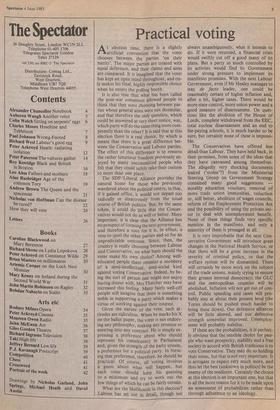Practical voting
At election time, there is a slightly artificial convention that the voter chooses between the parties 'on their merits'. The major parties are treated with equal deference, and their claims and aims are compared. It is imagined that the voter has kept an open mind throughout, and on- ly makes his final, highly responsible choice when he enters the polling booth. It is also true that what has been called the post-war consensus allowed people to think that they were choosing between par- ties whose general aims were not dissimilar, and that therefore the only question, which could be answered at very short notice, was, which party will do the same thing more com- petently than the other? It is said that at this election there is a real choice, by which is meant that there is a great difference bet- ween the Conservative and Labour parties. The effect of this difference is to remove the rather luxurious freedom previously en- joyed by many uncommitted people who felt that they could safely take their custom to more than one place.
The SDP/Liberal Alliance provides the natural home for those who previously wandered about the political centre, in that, if it gained office, it would not depart too radically or disastrously from the usual course of British politics. But, by the same token, it could do little that the Conser- vatives would not do as well or better. More important, it is clear that the Alliance has no prospect of forming the next government, and therefore a vote for it is, in effect, a vote to spoil the other parties and so for an unpredictable outcome. Since, then, the country is really choosing between Labour and Conservative, on what basis should the voter make his own choice? Among well- educated people there remains a snobbery of a semi-intellectual, semi-social kind against voting Conservative. Indeed, by be- ing the sort of person one might not enjoy having dinner with, Mrs Thatcher may have increased this feeling. Many fairly well-off people still imagine that there is something noble in supporting a party which makes a virtue of working against their interest. Given the nature of the vote, such at- titudes are ridiculous. When he marks his X on the ballot paper, the voter is not endors- ing any philosophy, making any promise or entering into any contract. He is simply ex- pressing a preference about who should represent his constituency in Parliament and, given the strength of the party system, a preference for a political party. In form-
ing that preference, therefore, he should be practical. Of course, all voting involves a guess about what will happen, but
each voter should keep his guessing to a minimum and try to work out the few things of which he can be fairly certain. What are the likelihoods in this election? Labour has set out in detail, though not always unambiguously, what it intends to do. If it were returned, a financial crisis would swiftly cut off a good many of its plans. But a party so much controlled by its activists would find its Government under strong pressure to implement its manifesto promises. With the next Labour Government, even if Mr Healey manages to stay de facto leader, one could be reasonably certain of higher inflation and, after a bit, higher taxes. There would be more state control, more union power and a good measure of disarmament. On ques- tions like the abolition of the House of Lords, complete withdrawal from the EEC, total nuclear disarmament and an end to fee-paying schools, it is much harder to be sure, but certainly none of these is impossi- ble.
The Conservatives have offered less detail than Labour. They have held back, in their promises, from some of the ideas that they have canvassed among themselves. The allegedly very shocking documents leaked (`stolen'?) from the Ministerial Steering Group on Government Strategy contained many good suggestions notably education vouchers, removal of more trade union immunities, reduction or, still better, abolition of wages councils, reform of the Employment Protection Act and the possibility of using the private sec- tor to deal with unemployment benefit. None of these things finds very specific mention in the manifesto. and only a minority of them is presaged at all.
It is very improbable that the next Con- servative Government will introduce great changes in the National Health Service, or that there will be a great increase in the severity of criminal policy, or that the welfare system will be dismantled. There will certainly be more work on the subject of the trade unions, mainly trying to ensure their greater internal democracy; the GLC and the metropolitan counties will be abolished. Inflation will not get out of con- trol. Public spending and taxes will pro- bably stay at about their present level (the Tories should be pushed much harder to bring these down). Our defensive alliances will be little altered, and our defensive strength somewhat improved. Unemploy- ment will probably stabilise.
If these are the probabilities, it is perfect- ly obvious that the sensible choice for peo- ple who want prosperity, stability and a free society in accord with British traditions is to vote Conservative. They may do so holding their noses, but that is not very important. It is arrogant to expect very much more, and thus let the best (unknown in politics) be the enemy of the mediocre. Certainly the choice at this election is an important one, but that is all the more reason for it to be made upon an assessment of probabilities rather than through adherence to an ideology.














































 Previous page
Previous page